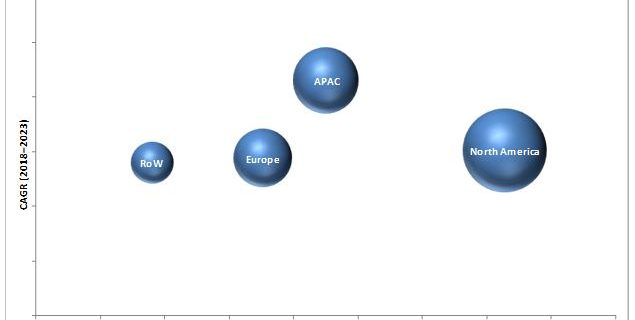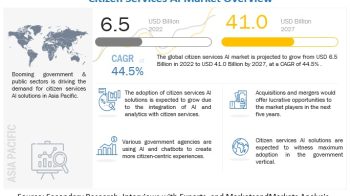
The Cognitive Security Market expected to grow from USD 3.62 billion in 2018 to USD 17.09 billion by 2023, at a Compound Annual Growth Rate (CAGR) of 36.4% during the forecast period.
Cognitive security leverages the benefits of technologies, such as machine learning, deep learning, and natural language processing, to analyze trends that enable enterprises to develop proactive/preemptive security solutions. The major factors driving the growth of the Cognitive Security Market are the increasing numbers of security breaches and cyber-attacks, and the need to assist security analysts in taking proactive security measures.
The Asia Pacific (APAC) region is expected to grow at the highest CAGR during the forecast period. Increasing incidents of cyber-attacks and the growing cyberwar in the APAC region have led organizations to deploy security solutions that have cognitive capabilities. Vendors in the Cognitive Security Market are focused on delivering cognitive security solutions that help enterprises easily and quickly respond to security breaches before they occur.
Download PDF Brochure @ https://www.marketsandmarkets.com/pdfdownloadNew.asp?id=82177606
The Cognitive Security Market by component is broadly classified into solutions and services. The services segment is expected to grow at a faster rate during the forecast period. The integration of cognitive capabilities into cybersecurity solutions makes the solutions very complex and requires the implementation of sophisticated algorithms for various cybersecurity types, such as endpoint security, network security, application security, and cloud security. Therefore, to achieve the desired results, cognitive security solutions require deployment and integration, and support and maintenance services, which is expected to increase the demand for security services during the forecast period.
The Cognitive Security Market by security type is segmented into physical security and cybersecurity. The cybersecurity segment is expected to grow at a higher CAGR during the forecast period. The growing number of mobile devices worldwide has made enterprise networks more vulnerable to cyber-attacks. Therefore, the demand for security solutions that can quickly identify and respond to these cyber threats is growing.
The Cognitive Security Market by enterprise size is segmented into large enterprises and Small and Medium-sized Enterprises (SMEs). The SMEs segment is expected to grow at a higher CAGR during the forecast period. Attackers mainly target SMEs to penetrate their applications for accessing customer information, payment details, and other confidential data. Therefore, SMEs are expected to adopt cloud-based, cost-effective solutions that can help them save various resources.
The Cognitive Security Market by deployment mode is segmented into cloud and on-premises. The cloud deployment mode is expected to have the larger market size and is projected to grow at a higher CAGR during the forecast period. As cloud-based solutions offer various benefits, such as better scalability, reduced operational costs, and ease of deployment, the demand for cloud-based cognitive services is expected to grow during the forecast period.
The Cognitive Security Market by application is segmented into threat intelligence, anomaly detection and risk mitigation, automated compliance management, and others (perimeter/border security automation, and fraud detection and prevention). The threat intelligence application is expected to grow at the highest CAGR during the forecast period, as the application helps organizations identify the existing and emerging security threats through evidence-based knowledge. On the other hand, the anomaly detection and risk mitigation application is expected have the largest market size during the forecast period.
Speak to Research Expert @ https://www.marketsandmarkets.com/speaktoanalystNew.asp?id=82177606
Furthermore, the Cognitive Security Market is segmented on the basis of verticals into aerospace and defense; government; Banking, Financial Services, and Insurance (BFSI); IT and telecom; healthcare; retail; manufacturing; energy and utilities; and others (media and entertainment, education, and transportation). Among these, the BFSI vertical is expected to grow at the highest CAGR during the forecast period. The BFSI vertical is very lucrative and attracts cybercriminals, as it holds sensitive information related to employees, customers, assets, offices, branches, and operations. Moreover, due to the growing digital operations, enterprises in the BFSI vertical have to prioritize cybersecurity and implement cognitive solutions to overcome the challenges in traditional security options for safeguarding the critical business information.
![[Latest 2028] Cloud Security Market Estimation, Key Players, Growth Opportunities](https://mnmblog.org/wp-content/uploads/2024/04/cust-350x196.webp)

